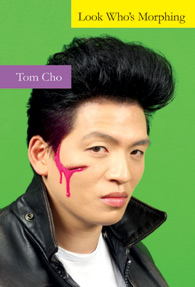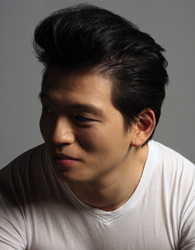The Singapore Writers Festival is back, with a program lineup featuring bestselling American author Michael Chabon, Freakonomics star Steven Levitt, Slumdog Millionaire writer Vikas Swarup, and former UK poet laureate Andrew Motion.

Naturally, for the purposes of this website we’re going to ignore those guys. Our spotlight is cast squarely on the openly queer writers who’re coming to town. Over the next few days, we’ll be featuring a series of interviews with these folks.
The first of our interviews is with the strikingly handsome Tom Cho. He’s a man of many labels: he’s a writer, an artist, a Chinese-Australian, a transgender man and an unapologetic fan of the teen romance series Sweet Valley High.
I first encountered him as the author of Look Who’s Morphing, a collection of bizarre and deliciously fun short stories. There are tales where a call centre is attacked by a group of evil ninjas, where the narrator re-enacts the entire romantic plot of The Sound of Music, and where he becomes a 55-metre giant who pleasures a horde of Japanese ladies with his colossal body.
As odd as this may be appear, it hasn’t turned off his readers. Since its publication in 2009, the book has been nominated for the Commonwealth Writers’ Prize for Best First Book (South East Asia and Pacific), 2009 Age Book of the Year (Fiction) and Melbourne Prize Trust’s 2009 Best Writing Award.
Cho is scheduled to appear at the panel discussion “Why So Serious” on Saturday 29 October. He warns there’s a small chance he may have to miss this appearance, since he has some family emergencies back in Melbourne. Nonetheless, he’s agreed to grant us an interview in advance.
æ: Age, occupation, location?
Tom: 37; artist; Melbourne, Australia.
æ: Could I ask, first of all: do you identify as transgender, queer, or…?
Tom: Luckily, it's not an either/or situation. So the short answer is: "Both, and more besides!"
æ: Let’s talk about your first book, Look Who’s Morphing. How and when did it get written?
Tom: It took me a long time to write the book. One reason was because the concept for the book kept changing. I initially set out to write a book about Asian popular culture but, ultimately, the central theme of the book is personal identity.
Mid-way through writing the book, I also decided to turn it into a PhD, so that added a few more years onto the process! Finally, while I was writing the book, there were some times when "living got in the way of writing" – basically, I had to take time out from writing to do other things. So I began writing the book in around 2000 and it wasn't until 2009 that it was published – definitely a long process.
æ: I really love how campy the story is – how it’s full of over-the-top scenarios, full of references to classic film, TV and rock music.
Tom: Camp is an exaggerated kind of sensibility. It's theatrical and full of guile and artifice and excess. [It] doesn't sit quietly in the corner and neither does my writing.
When I studied creative writing at university, the kinds of things that I was taught seemed to be almost like the antithesis of camp. I was encouraged to be "spare" in my writing, to "show, not tell", and to not "over-write". Those teachings were grounded in all these artistic norms that I still think about. What do those norms mean? I think they can encourage writers to be understated. I think they can discourage writers from putting their views up front and centre in case their work is seen as too didactic. I think they can even appeal to a sort of naturalism in writing.
æ: What’s been the response like to Look Who’s Morphing?

Tom: The book was received very well. It was short-listed for a few literary awards. It was reviewed widely and the reviews were almost all positive. There were two quite negative reviews of the book, but they generated some good dialogue – I ended up learning that receiving negative reviews is not necessarily a negative experience. I've felt gratified that the people who have enjoyed the book have really appreciated its playfulness and originality. There really is no other book like it!
æ: So there wasn’t any backlash regarding the book’s sexual content?
Tom: Very few reviews discussed the sexual explicitness in the book. I do consider that a problem – that, and the fact that my book is considered too rude to ever be a set text for high schools. But, that aside, I've had no major controversies yet!
æ: Have you suffered any discrimination for being trans – or have you encountered less, since you’re now a man rather than a woman?
Tom: Naturally some of my experiences of discrimination are different to those of women. I can be outspoken with much less fear of being called bossy. If I have a lot of sexual partners, I don't fear that I'll be derogatively labelled as a slut. My expectations around fear of rape are different to those of women. That's just for starters.
I think masculinity is this really fragile concept, and clearly some people, some institutions, feel they have to shore it up and protect it. I think people of all genders lose out because of this. Men are certainly under pressure to live up to rigid ideals of masculinity. I've had my own anxieties in that respect too. Being trans hasn't enabled me to escape these pressures.
In their own way, transgender people can really threaten that whole process of vigilantly safeguarding masculinity. More than that, some people find transness a big challenge because it has the potential to topple over these monolithic concepts of "male" and "female" and all the assumptions that come with those twin concepts. Probably since I do circulate a lot in gay and lesbian networks, a fair amount of the discrimination I've experienced has come from within those networks. I've encountered gay and lesbian organisations that have a long way to go in terms of being trans-inclusive. I've certainly had experiences where gay men have been rude to me when I've disclosed my transness to them.
But layered on top of my anxieties and my experiences of discrimination are other factors. I have a great circle of queer and trans friends. I had a middle-class upbringing and I'm university educated with a PhD. And I've had a good career – I don't feel that my gender transition precedes or dominates my standing as an artist. I feel that I'm respected for what I do. I didn't lose my job due to gender transition and I lost very few friends. In all, I think I'm lucky.
æ: What’s coming next?
Tom: Well, second books are supposed to be notoriously difficult but maybe I have dreamt up the most difficult second book possible. At the end of 2009, I decided that I wanted to write a fiction book that would answer the question "What is the meaning of life?" So I've begun writing a book about the philosophy of religion. Unfortunately, I don't have much of a background in philosophy and there is so much about religion that I don't know. I've also realised that, in order to address the question "What is the meaning of life?", there are all these other attendant questions that I need to address. Nonetheless, I am writing this big book that has the working title The Meaning of Life and Other Fictions.
If the book sounds a bit dry, it really isn't. Much like my first book, it is full of humour and engagement with popular culture – especially robots. I am plumbing as many robot tropes as I can! I even went to Japan for a residency to research more about robots.
It's also a book with a big heart, I think. I feel that the writing process has been full of thoughtful consideration for the subject matter. Ultimately, the book is not some joke concept but it comes from a genuine desire to examine some perplexing questions that affect us all.
Tom will appear at the Singapore Writers Festival event “Tell Me a Story” on Sun Oct 23, 1pm-2.15pm at Festival Pavilion, Campus Green, Singapore Management University with Kamini Ramachandran from MoonShadow Stories who will read poetry and excerpts of prose, including works by SWF 2011 featured writers Tom Cho, Catherine Lim, François Lelord and Chuah Guat Eng.
Please note additional timeslot: Tom will also be on the Singapore Writers Festival panel discussion “Why So Serious” with Neil Humphreys and Chuah Guat Eng on Sat 29 Oct, 11.30am-12.30pm at the Transaction Pavilion, Campus Green, Singapore Management University. Tom will also give a free reading at the Festival Pavilion on the SMU Campus Green later that day, 5.45pm-6pm. Festival passes are $15 from Sistic.
His website is tomcho.com. Information on how to buy Look Who’s Morphing is provided there. The Singapore Writers Festival website is singaporewritersfestival.com.
